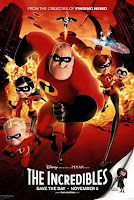
While this entry isn't firmly in the stated purpose of the blog, I have been thinking about this film since I saw it and so feel compelled to write my impressions.
It goes without saying that the current President isn't terribly popular. When respected newsmen like Paul Begala can say pretty inflammatory things about him without anyone arguing back, it is clear that our confidence in our country's leadership is at an all-time low. It is one of the main reasons I'd say that the country's eyeballs have been glued to the Presidential race like never before: after what the majority of America views as an eight-year costly mistake, we are ready to look forward and see where we can stumble towards now.
Except, one man is still looking backwards. Oliver Stone has made a biopic about a standing president, an unprecedented gesture from one of America's most enigmatic filmmakers. Stone's films are liberal, psychedelic and in many ways prophetic. He isn't afraid to criticize the country he loves, in the hope that through his criticism he challenges us to be better ourselves.
Thus it comes as a shock that W. is a largely sympathetic view of the man. Yes, Bush is presented as being conservative, short-sighted and a man of limited intellect (though Stone goes to great effort to push the idea that Bush's memory and personal skills are actually exceptional if nor admirable). But he is also presented through Josh Brolin's depiction as a complicated and tragic figure, a man who loves his country, his wife and, yes, his God.
I would argue that Bush is not the villain of the film, but he certainly isn't the protagonist either. Throughout the film, Bush feels the need to remind people that he is the President of the United States, or as he defines that role, the Decider. He makes the final choice in all cases. That is his power. He pushes the button, controls the pen.
Only, of course, he has no control over his destiny. He surrounds himself with dangerous men (most chillingly Richard Dreyfuss' Oscar-worthy turn as Dick Cheney) who have much less pure motives, but know which buttons to push to get W. on their side. Stone argues that Bush bought into his own smoke operation, that his movements against Iraq were based on his personal hate of Saddam Hussein and his desire to protect his country, not on the greed for oil that Cheney in the film openly states in the reason for this war.
The lasting image of the film, for me, is Bush as a man of great passion and personable character with limited vision. Throughout the film, we are reminded what a serious sports fan Bush is. He knows baseball the way that we expect presidents to know foreign relations. He is shown watching college football constantly in the height of his political difficulties. This obsession seems to shed some light on the limit of his political vision; Bush has generated much criticism for his "you're either with us or against us" stance, but the dichotomy perfectly reflects the mind-set of someone who views the world as a sports contest. Near the end of the film, Bush states his frustration and belief that there is Good and Evil in the world, and it is Good's responsibility to fight Evil.
There is no room for discussion or any gray area in that world view. And for Stone, that seems to be where Bush has fallen short and hurt our nation; we don't live in simple, black and white times. And we never have.





